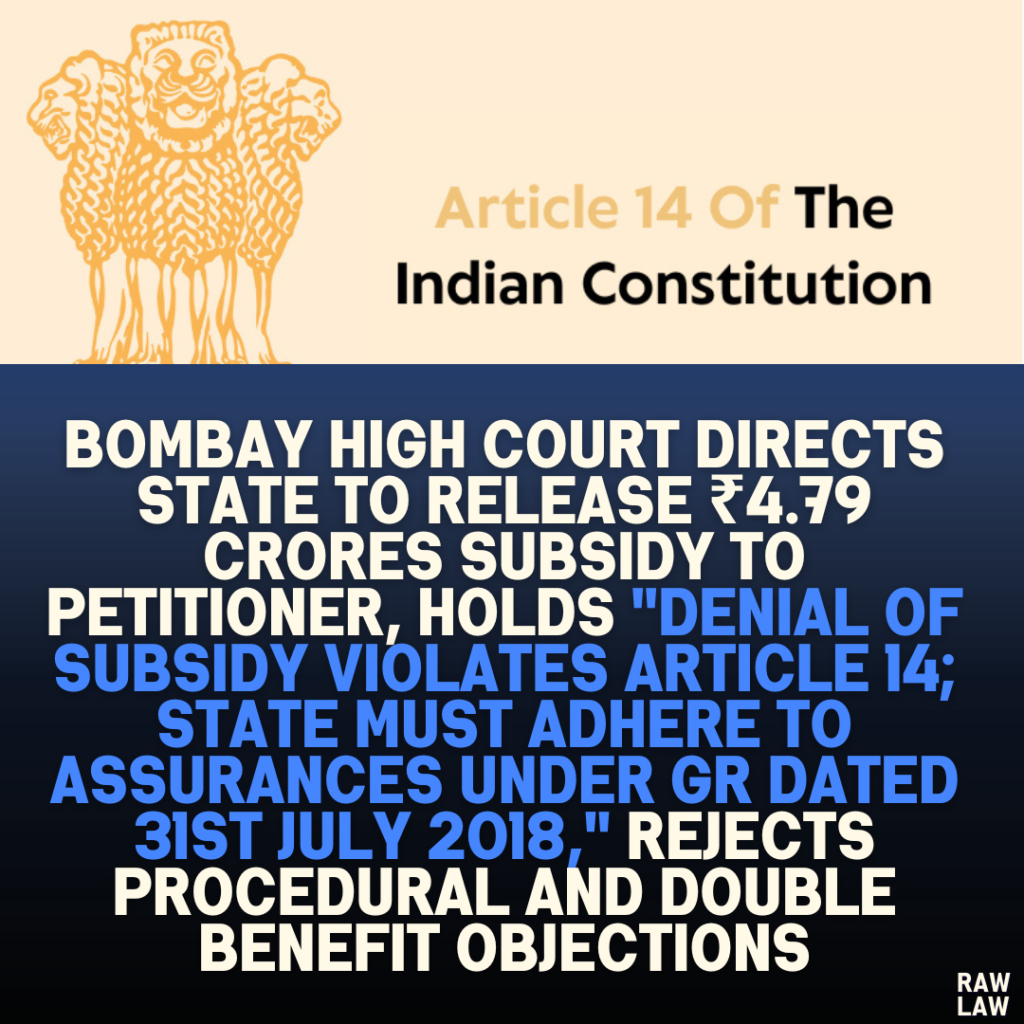Court’s Decision
The Bombay High Court directed the State of Maharashtra to release ₹4,79,94,000 as export subsidy to the petitioner within six weeks. The court emphasized that denying the subsidy when similarly placed entities, like Indapur Dairy, had received it violated the petitioner’s fundamental rights under Article 14 of the Constitution. The court also held that the State’s procedural objections, including the absence of finance department approval for the Government Resolution (GR), could not override judicial orders confirming the petitioner’s entitlement.
Facts
In 2018, a drastic fall in milk powder prices affected manufacturers, who could not cover production costs, leading to reduced milk procurement and losses for dairy farmers. To address this crisis, the State issued a GR on 31st July 2018, introducing an export subsidy of ₹50 per kg of milk powder for stock existing as of 30th June 2018.
The petitioner, a milk powder manufacturer, exported 959.88 metric tons between December 2018 and January 2019, claiming a subsidy of ₹4,79,94,000. Despite clear evidence of entitlement, including verification by the Dairy Development Officer and an order from the Principal Secretary, the State failed to release the payment. Repeated representations and legal proceedings did not yield results, compelling the petitioner to file the present writ petition.
Issues
- Article 14 Violation: Did the denial of subsidy violate the petitioner’s right to equality, given that similarly placed entities had received the benefit?
- Rules of Business Compliance: Was the GR invalid due to non-compliance with the Maharashtra Rules of Business requiring finance department approval?
- Double Benefit Claim: Would granting the subsidy amount to a double benefit for the petitioner?
Petitioner’s Arguments
- Entitlement Established: The petitioner argued that it fulfilled all conditions under the GR and provided detailed export statements verified by the Dairy Development Officer. The Principal Secretary’s order also confirmed the entitlement to ₹4,79,94,000.
- Article 14: The petitioner claimed unequal treatment, as Indapur Dairy, under identical circumstances, received the subsidy. Denial to the petitioner violated the principles of non-discrimination.
- Legitimate Expectation: The petitioner relied on the State’s assurances under the GR to export milk powder, even at a loss, to qualify for the subsidy.
Respondent’s Arguments
- Rules of Business Non-Compliance: The respondents argued that the GR was issued without the finance department’s concurrence and approval from the council of ministers, rendering it invalid.
- Double Benefit: The State claimed that the petitioner already availed subsidies under a prior GR dated 10th May 2018, and granting the current subsidy would lead to a double benefit.
- Negative Equality: Citing Supreme Court precedents, the State contended that the petitioner could not claim parity with Indapur Dairy if the GR’s implementation was flawed.
Analysis of the Law
1. Article 14 – Right to Equality
The court held that denying the subsidy to the petitioner violated Article 14, as similarly placed entities had received the benefit. The State’s refusal to treat the petitioner equally was arbitrary and discriminatory, undermining the principle of fairness.
2. Rules of Business Compliance
The State argued that the GR was invalid due to non-compliance with Rules 9 and 11 of the Maharashtra Rules of Business under Article 166(3). However, the court observed that these procedural objections could not override the orders passed by this court, which had validated the GR and its implementation in similar cases.
3. Double Benefit Claim
The court rejected the claim of double benefit, noting that the schemes under the GRs of 10th May 2018 and 31st July 2018 were distinct and independent. Further, the Principal Secretary’s order and subsequent inquiry confirmed that no other benefit had been availed for the stock in question.
Precedent Analysis
- Indapur Dairy Case: The court relied on its earlier orders directing the State to release subsidies to Indapur Dairy under the same GR. Denying the petitioner similar relief would violate the principles of equality.
- Supreme Court Cases on Negative Equality: The court distinguished the present case from precedents where illegality in prior benefits could not be claimed as a right. Here, the court noted that subsidies granted to Indapur Dairy were lawful, and denying the same to the petitioner would amount to discriminatory treatment.
Court’s Reasoning
- Equality in Welfare Schemes: The court emphasized that subsidies under the GR were a welfare measure intended to benefit all eligible manufacturers. Denying the petitioner the subsidy while granting it to others would violate the core principles of Article 14.
- Binding Nature of Court Orders: Procedural objections raised by the finance department could not override judicial orders. The court reiterated that the State had a constitutional obligation to comply with its assurances under the GR.
- Legality of the GR: The GR dated 31st July 2018 was validly issued and implemented. Any argument questioning its validity could not justify denying the petitioner its rightful entitlement.
Conclusion
The court made the rule absolute and issued the following directions:
- The respondents must release the subsidy amount of ₹4,79,94,000 to the petitioner within six weeks.
- The petitioner is free to make a representation for interest on the delayed payment, to be considered separately.
Implications
This judgment reaffirms:
- The enforceability of government resolutions in welfare schemes.
- The principle of equality under Article 14, ensuring fair treatment for all beneficiaries.
- The binding nature of judicial orders over administrative objections.
The ruling also sets a precedent for holding the State accountable for timely disbursal of benefits under welfare schemes, upholding the rule of law and public trust in government policies.



